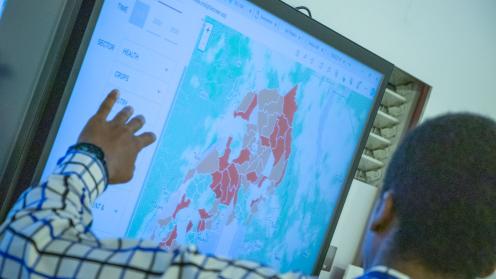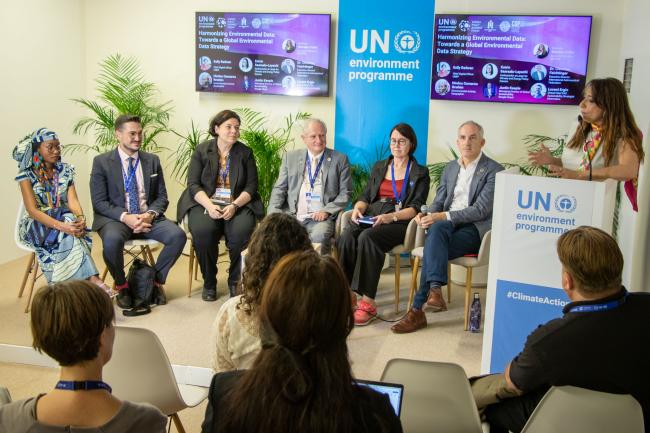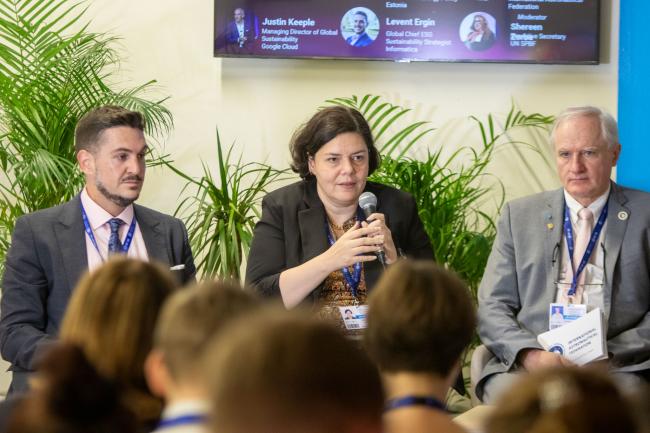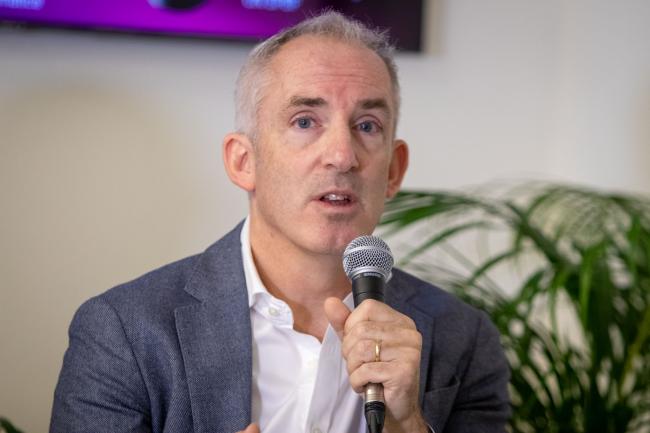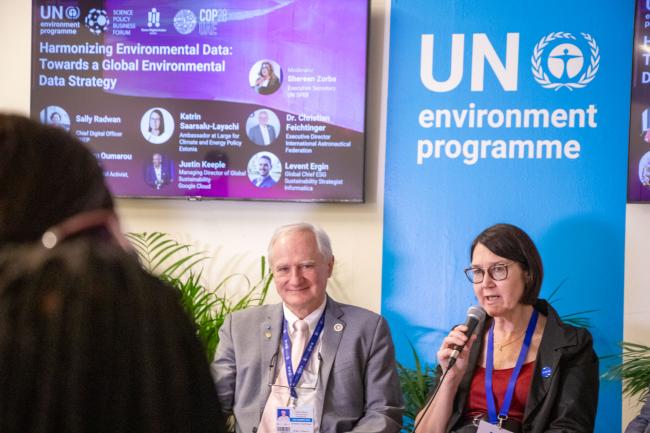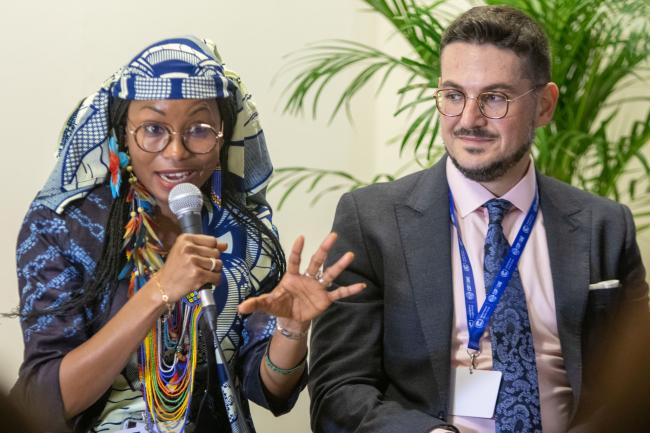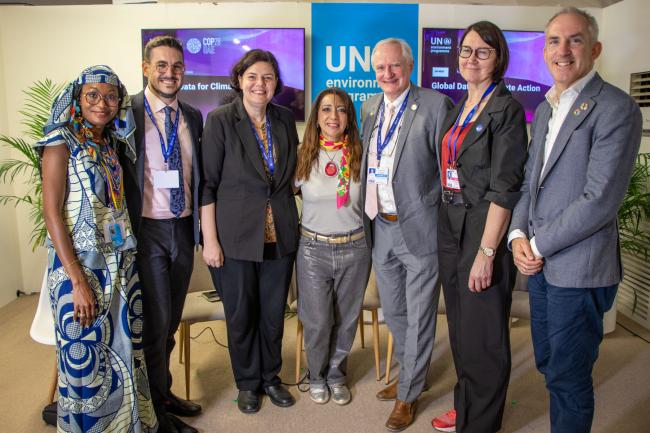Summary
Digital technologies such as Earth observation systems, including space technology and remote sensing, and Artificial Intelligence (AI) improve transparency and accountability in reporting, identifying solutions and collaborations to achieve the objectives of the Paris Agreement.
Harmonizing Environmental Data: Towards a Global Environmental Data Strategy
Reliable, accessible, comparable, and transparent environmental data for better decision-making has a pivotal role to play at a time when the world is not on track to meet any of its global environmental goals. Now, new technologies such as Earth observation systems, including space technology and remote sensing, and Artificial Intelligence (AI) have the potential to improve transparency and accountability, and to help identify solutions and collaborations to achieve the objectives of the Paris Agreement, among others, across sectors.
Held on Digital Day at the UN Environment Programme (UNEP) Pavilion, this side event explored the rationale and the requirements for the development of the UNEP-led Global Environmental Data Strategy (GEDS); gaps, priorities, and opportunities for climate action data; elements relating technology use and equitable sharing of Big Data products and services; and developments in the work of the Data for the Environment Alliance (DEAL).
Moderator Shereen Zorba, Head, UN Science-Policy-Business Forum (UN-SPBF), noted that, as “businesses, governments, citizens, consumers [...] we need checks and balances and to know the impact of our actions better.” She explained that, in March 2019, led by its Estonian Presidency and partner Member States, the Fourth UN Environment Assembly (UNEA-4) unanimously passed a Ministerial Declaration that mandated UNEP to develop the GEDS by 2025, a call reiterated in the UNEP at 50 Declaration. She said this event was one in a series of “key moments” for this Strategy, pointing to the Vienna Expert Group Meeting that took place in September 2023. The next of such moments, Zorba added, would be on 27 February 2024 at UNEA-6 in Nairobi.
In opening remarks, Sally Radwan, Chief Digital Officer, UNEP, said the GEDS is needed because “data alone isn’t enough; it’s what you do with the data, the insights, that matters.” She explained that the GEDS therefore seeks to address “incoherent, inconsistent” data, and instead harmonize data quality, interoperability, governance practices, accessibility, and interoperability. In response to a question on operationalizing this data at scale, Radwan said this should be done “step-by-step. We are prototyping, we are experimenting.” A requirement, she underscored, would be a foundation of harmonized data sets that would allow users with different needs to build scenarios. Noting that AI can facilitate the building of environmental data dashboards and scenarios on demand, she described ongoing conversations with multiple stakeholders on the core pillars of the strategy.
Katrin Saarsalu-Layachi, Ambassador for Climate and Energy Policy, Estonia, described DEAL, a Member-State-led global cooperation initiative initiated by the Government of Estonia, representing 34 countries and facilitated by the UN-SPBF, that was launched at UNEA-5. She explained Estonia’s efforts to build a digital society and its belief that environmental data can fill knowledge gaps as well as be a source of economic growth. DEAL, she underscored, takes a multistakeholder approach to knowledge exchange on data insights, and seeks to build a strong network to improve our collective capacity to assess the status of the global environment and climate. She highlighted the importance of doing so in an inclusive manner, noting “this is also what DEAL is there for, it is a perfect tool to help with capacity building, cooperation, collaboration, and knowledge exchange.”
Christian Feichtinger, Executive Director, International Astronautical Federation (IAF), discussed IAF’s role in scaling up space technology for climate change mitigation and adaptation, particularly relating to methane emissions. He underscored the need to raise awareness of the potential of space science as an important pillar of climate action. He remarked that communities vulnerable to climate change impacts are, “drowning in data but starving for information,” explaining that while there are large amounts of data available, the space community needs to complete the last mile of transforming this into information to bridge the gap between data and solutions.
Justin Keeble, Google, said Google Maps and Google Flights are providing individuals with information such as carbon intensity of travel and options for eco-friendly travel routes. He also reported on the Google Flood Hub, constructed through AI modelling of weather and river data, to provide information, including SMS alerts, on flooding incidents. Google Earth, he said, continues to provide free access to geospatial data for academia, governments, and the private sector to enable, among others, decarbonizing business supply chains. He noted Google’s support to the Race to Resilience campaign aimed at catalyzing the climate resilience of 4 billion vulnerable people by 2030.
Levent Ergin, Informatica, said data silos and the lack of standardization are key challenges for decision making. He drew attention to the International Sustainability Standards Board's (ISSB) work on data standardization to achieve globally consistent, comparable, and reliable climate-related financial disclosures. He reported the G20’s acceptance of these standardization efforts and underlined that the linking of satellite mapping and remote sensing to climate data has improved the accuracy of emissions tracing compared to conventional carbon calculation methods.
Hindou Oumarou Ibrahim, Co-Chair, International Indigenous Peoples Forum on Climate Change, said Indigenous Peoples play a key role in climate data through Indigenous and local knowledge. She discussed an example of a participatory mapping exercise with communities around Lake Chad involving the use of satellite maps to include on-the-ground data and information on biodiversity and other environmental features. The finalized community map and the mapping process, she noted, has been included in Chad’s National Adaptation Plan. She highlighted the need to co-design data projects with Indigenous Peoples in order to produce shared outcomes.
In closing, panelists committed to, among others, pushing for recognition of Indigenous knowledge as data, and leveraging accessibility of digital technologies for climate action. Placing emphasis on the role of space data, Feichtinger concluded that, “space will not save our planet, but our planet will not be safe without space!”
Organizer: UN SPBF
Contact: Shereen Zorba | shereen.zorba@un.org
For more information: un-spbf.org/
To receive free coverage of global environmental events delivered to your inbox, subscribe to the ENB Update newsletter.
All ENB photos are free to use with attribution. For this COP 28 side event, please use: Photo by IISD/ENB | Matthew TenBruggencate.
